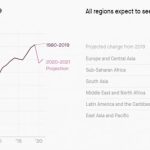Brexit and Covid blamed as Asia-UK shipping rates increase fourfold
The cost of importing containers filled with consumer goods from Asia into the UK has reached a record high after a surge in demand in the weeks before Christmas and the UK’s exit from the EU.
Shipping experts believe the UK has been dealt a double blow by the impact of the coronavirus, which has disrupted global shipping supply chains, and the end of the Brexit transition period, which caused a large increase in imports in the last months of 2020.
Container freight rates from Asia have increased almost fourfold since November to reach $10,000 for a 40ft unit for the first time, amid a global rebound in demand for consumer goods and materials, and congestion across UK ports, where many empty containers have been left stranded.
Vincent Clerc, chief commercial officer for Maersk, the world’s biggest shipping company, said on Wednesday there were “simply not enough containers in the world to cope with the current demand”. He said that recent lockdowns in the UK and across Europe may even spur further online purchases of consumer goods such as home exercise equipment and furniture for “at least for some weeks … It is really crazy how much we are moving at the moment, huge amounts,” he said.
UK food freight firms warn of looming ‘catastrophe’ from clogged portsRead more
Giant container carriers left off the coast of Singapore during the most stringent coronavirus measures last spring have already re-entered the shipping market to help ship containers to Europe, according to Simon Sundboell, boss of maritime intelligence company eeSea. “Demand is back to pre-coronavirus levels, it may be even stronger. Perhaps people are buying TV screens rather than going on holiday to Thailand,” he said.
However, the shipping slowdown in the early months of 2020 had made filling empty shipping containers with goods more difficult, because it had upended the complex global shipping sector, he said.
Simon Wolfson, the boss of fashion retailer Next, said earlier this week that the company’s clothing stock was down 10% compared with last year owing to shipment delays of two to three weeks from Asia. “It is not getting it into the country that’s the problem; it’s getting it into a container at the other end,” he said.
George Griffiths, the head of global container freight markets at S&P Global Platts, said the lack of empty containers in Asian ports was at the root of soaring container prices. The S&P Global Platts index for container freight prices, which reached a record $10,000 earlier this week, was likely to rise further and may push up the cost of consumer goods, he said.
“The ongoing problem is that there’s just a lack of empty containers in key exporting hubs, specifically across Asia, so there aren’t any available to export goods into the Europe and UK markets. This has created a real imbalance,” he said.
‘Humanitarian crisis’: UN panel decries Covid rules that trapped crews at seaRead more
The global rebound in shipping demand has been compounded by Britain’s hurry to stock up on materials and goods before the Christmas season and the severing of ties with the EU. This left many shipping containers stranded by warehouses and on the quayside of ports across the UK and Europe, after the influx of freight at the end of last year.
In the past, it would have taken two to three days for a container arriving in the UK to be unloaded at the nearby warehouses and return to the port to begin the journey back to where it came from. But in recent months, in some cases it has taken the skeleton port staff, working under Covid-19 restrictions, two to three weeks to empty containers, Griffiths said.
The incoming cargoes, which included 11,000 containers of medical PPE, plunged the UK’s ports into chaos, with mountains of containers piling up. Although the container stacks were beginning to shrink, rebalancing the global supply chain was expected to take months, in part because of coronavirus working restrictions.
Sign up to the daily Business Today email or follow Guardian Business on Twitter at @BusinessDesk
“Some container liners won’t stop [in the UK] because it’s not worth incurring the hours of delay and higher costs. Those liners which are willing to stop in the UK are charging a premium, given the limited supply,” Griffiths said.
He said the “self-perpetuating cycle” posed a risk to UK exports, and also the much-needed return of empty containers to Asia, which could help to lower the cost of UK imports. The pattern was expected to last at least until after the lunar new year in the middle of next month, but could continue until the second quarter of this year.
A spokesperson for Felixstowe, Britain’s biggest container port, declined to comment.



